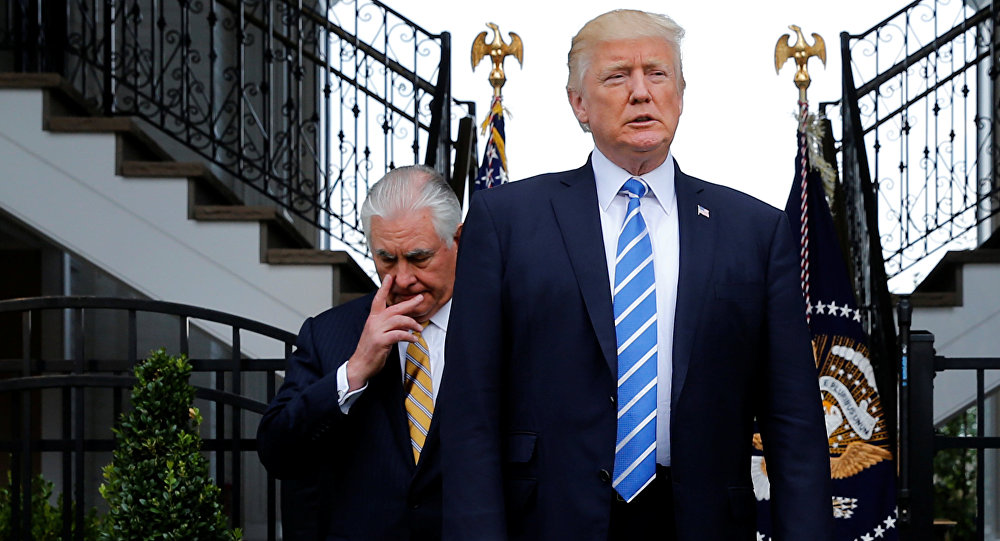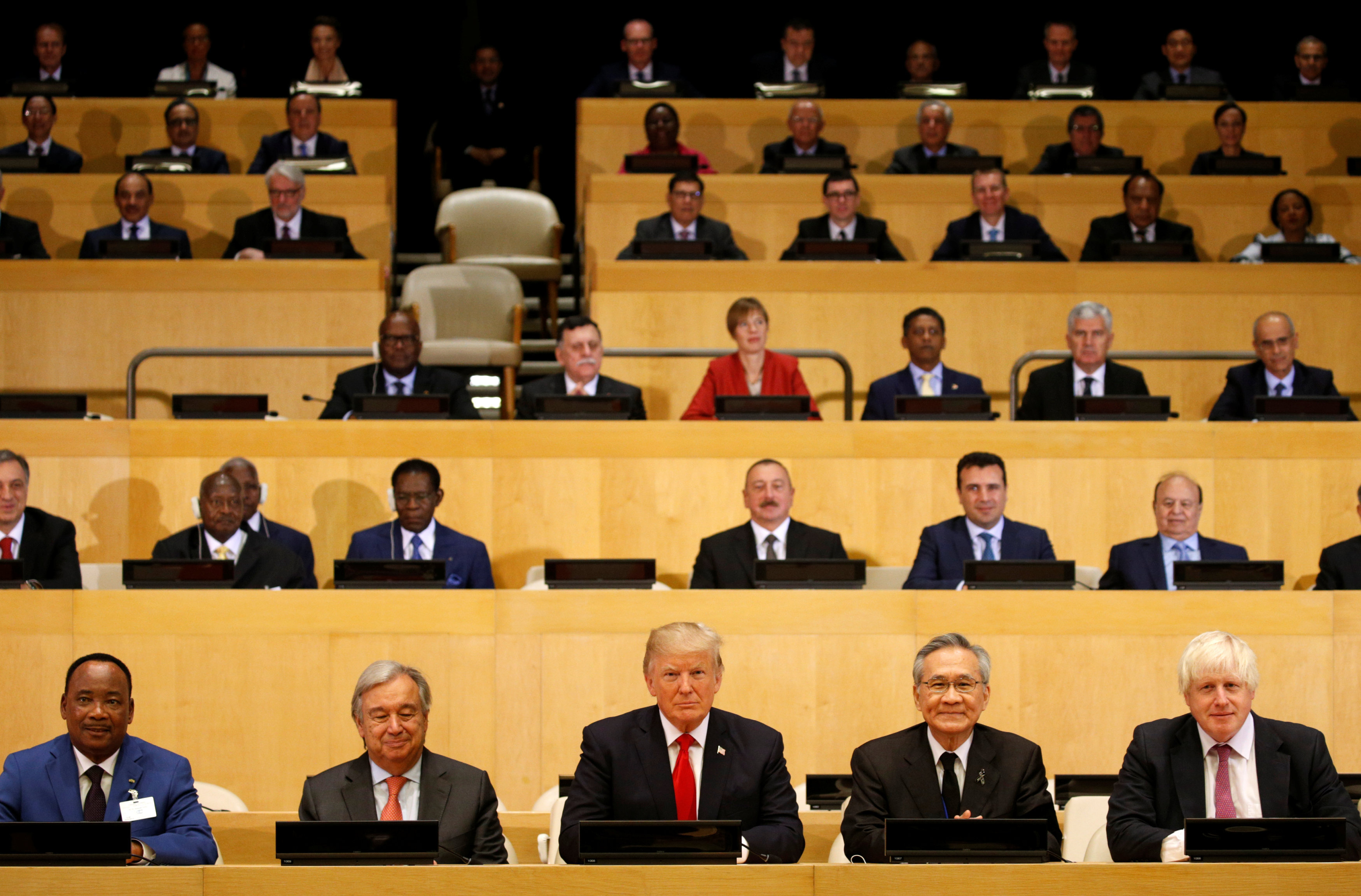
 Donald Trump is powerless to break the vicious circle of anti-Russian policies championed by the US foreign policy establishment, US academic Vladimir Golstein told Sputnik. Under these circumstances Russia needs to concentrate on building partnerships with other countries, ensuring security and economic development, he believes.
Donald Trump is powerless to break the vicious circle of anti-Russian policies championed by the US foreign policy establishment, US academic Vladimir Golstein told Sputnik. Under these circumstances Russia needs to concentrate on building partnerships with other countries, ensuring security and economic development, he believes.
Donald Trump "was not happy" with the Russia sanctions bill and would obviously like to bring the ongoing diplomatic scandal to a halt, but he has little political leverage to fix the situation, Vladimir Golstein, Associate Professor of Slavic Studies at Brown University, told Sputnik.
"Trump would like to 'get along' with the Russians, but so far, he does not seem to have the actual mechanisms of power to implement his plan. The same can be said about the Secretary of State, Rex Tillerson," Golstein said.
Why 'Trump Has to Choose His Battles Carefully'
The academic highlighted that Trump needs the support of the US Congress to pass his initiatives including "bringing jobs to the United States, or solving trade imbalances, or resolving the issues of legal and illegal immigration," therefore, "he has to choose his battles carefully."
"Once the US Congress voted for the sanctions bill almost unanimously, there was no point Trump chasing a lost cause that would lead to him being ostracized by the Congress with which he still has to work on other issues," he underscored.
Likewise, Trump didn't raise a finger to return two Russian diplomatic compounds "frozen" under the previous administration over the alleged "Russian interference" in the US presidential elections, because "he is clearly afraid of being accused of 'being soft on Russians.'""What Trump seems to be missing (and he does not seem to have really serious Russia specialists in his team) — is that these diplomatic hostilities can easily get out of hand," the academic stressed, "Trump has fully lost initiative on this issue."
As a result, Trump has allowed "State Department and the foreign policy establishment to call all the shots" which makes him look weak, Golstein said.
The academic pointed out that "in his refusal to challenge the foreign policy and military establishment, Trump might have painted himself into the corner where the only thing he might be able to do is to send bombers into a foreign territory."
"That's hardly a position that any politician wants to be," he remarked.

Who is Fanning the Diplomatic Scandal With Russia
The question then arises as to what US forces are responsible for fanning the diplomatic scandal with Moscow and whether Trump could somehow break this vicious cycle and settle the conflict?
"The purpose of the so called Washington Consensus, that is the political, military, diplomatic and scholarly establishment which has the key positions in State Department, Pentagon, and major Washington think tanks, like Council for Foreign Relations, or Atlantic Council is to keep business as usual," Golstein explained, adding that it means to keep Americans "scared of the outside world — Russia in particular — and re-channeling the maximum of tax money into Military Industrial Complex."
However, what is important to emphasize, the academic continued is that "in this scenario, Russia is supposed to play a particular role: that of a frightening and hostile country."
The academic noted that "the so called, 'deep state,' that is the combination of the established politicians, business leaders and the press, is too much vested in the business as usual, in consistently pushing Russia into the role of adversary."
"Consequently, the old establishment is bound to generate endless provocations, in the hope that the Russian response to these provocations could be used by the Washington propaganda machine as an example of Russian danger, which requires continuous investments in militarism," he elaborated.
Is the US Liberal Elite Demonstrating 'Maturity'?
Meanwhile, The New York Times, a left-leaning newspaper published two op-eds entitled "For the U.S., Arming Ukraine Could Be a Deadly Mistake" and "The Cold War and America's Delusion of Victory" on August 25 and August 28 respectively. The articles came as a bolt from the blue given the media outlet's common anti-Russian stance.
Was it a mere coincidence or a sort of positive signal sent by the US liberal establishment to Moscow?
"Once in a while, the US liberal elite feels the need to act 'mature' and 'reasonable' and contemplate the dangers that can be posed by the actual military confrontation with Russia," Golstein responded, "As if they want to send the message to its most concerned and serious readers that they are aware of various dangers of militarism."
Unfortunately, "that does not last very long," he emphasized adding that "after showing some signs of maturity, that very liberal elite falls back into the already familiar and well-oiled pattern of subverting everything what Trump proposes, be it reasonable or unreasonable, coupled with their deep commitment to Washington consensus model of business as usual, which means: military investments, casting Russia as the perennially backward, aggressive, and tyrannical adversary, and keeping its own population insecure and paranoid about foreign interferences."The crux of the matter is that "deep inside [the US liberal elite] doesn't really believe that Russia can be provoked into the war," Golstein noted.
Right Now 'There is No Hope of Sanity Prevailing in Washington'
According to the academic, right now there are signs of change, although "common people, businessmen, academics, serious people in military" are actively seeking it.
"Frankly, with the exception of several politicians, journalists, and diplomats, there are not enough influential forces in the United States who can do something about fixing the relations between the two countries," he said.
Golstein pointed out that "since there is no hope on the sanity prevailing in Washington, it is clear that Russia has to do things on its own: making sure that its borders are secure, its partnership and cooperation with other countries are strong and flourishing, and that the country acts in a fair and reasonable way."
"Sooner or later, the new generation of politicians that would replace the old establishment mired in Cold War mentality and practices, would be mature enough to face the changed reality and act accordingly," he concluded.
The recent diplomatic standoff between Moscow and Washington started over the expanded package of sanctions against Russia, Iran and North Korea adopted by the US in early August.
In response the Kremlin announced that the diplomatic presence of the United States in Russia would be scaled down by 755 people to 455, which equates to the number of diplomatic personnel Russia has in the United States.
The move came also in a mirror measure to the expulsion of 35 Russian diplomats and the closure of two Russian compounds in 2016 over alleged "Russian interference" in the US 2016 elections.
Consequently, the US Embassy in Moscow announced it was suspending non-immigrant visa processing in Russia starting from August 23, citing lack of staff.
Additionally, on August 31 Washington demanded that Russia shut down its consulate general in San Francisco and two other diplomatic entities in New York City and Washington, DC, by September 2.



_jpg/250px-ElbeDay1945_(NARA_ww2-121).jpg)





